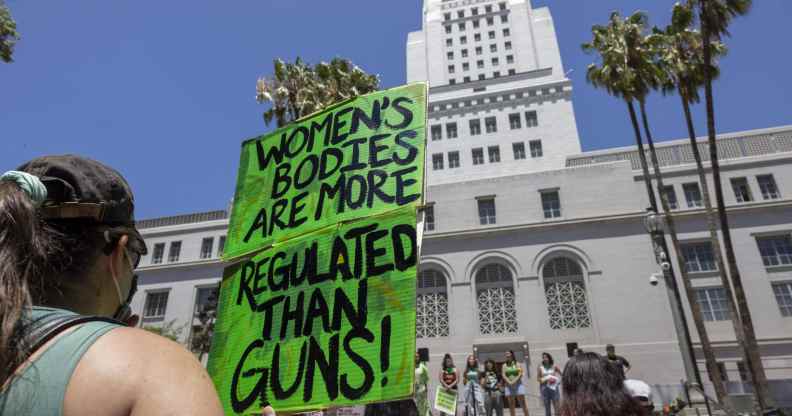Pride marches turn into abortion rights protests: ‘There’s a cloud over everybody who has a uterus’

Protesters rally near City Hall in Los Angeles to denounce the US Supreme Court decision to end federal abortion rights protections (David McNew/Getty Images)
Pride parades taking place in several United States cities have turned into abortion rights protests after the landmark Roe v Wade ruling was struck down in the Supreme Court.
Parades in New York, Chicago, San Francisco, Seattle and Denver turned into a show of support for abortion after the decision on Friday (24 June) to reverse the 1973 decision that legalised abortion throughout the US.
In New York City, healthcare charity Planned Parenthood took part in the Pride parade in protest of the move.
The organisation posted on Twitter: “Thank you for standing up for abortion access and taking action. This is only the beginning.
“We are committed to keep fighting for the care you deserve.”
In Seattle, there were chants of “we want abortion on demand” as crowds marched.
Nikkita Oliver, a grand marshal for the parade, told the crowd (per The Seattle Times): “If 50 years from now we want to celebrate a Pride that is really about freedom and liberation, we have to stop expecting that the system will deliver anything different than what is always has, which is oppression.”
Maya Reddick, a high school student attending San Francisco’s Pride parade turned abortion protest, told Reuters: “It feels like there’s a cloud over everybody who has a uterus.”
Thank you for standing up for abortion access and taking action. This is only the beginning. We are committed to keep fighting for the care you deserve. #WeWontBackDown pic.twitter.com/Za7lOb5hFz
— Planned Parenthood (@PPFA) June 26, 2022
The LGBTQ+ community and experts have argued that the fight for legal abortion and queer rights are interlinked, even warning that the Supreme Court could come for same-sex marriage after dismantling Roe v Wade.
Judge Clarence Thomas, in his legal opinion coinciding with the overturning of Roe v Wade, called on his colleagues on the Supreme Court to “reconsider” the rulings that currently protect the right to contraception (Griswold v Connecticut), same-sex relationships (Lawrence v Texas), and same-sex marriage (Obergefell v Hodges).
Thomas wrote that the Supreme Court should “reconsider all of this Court’s substantive due process precedents, including Lawrence, and Obergefell.”
He wrote: “Because any substantive due process decision is ‘demonstrably erroneous’… we have a duty to ‘correct the error’ established in those precedents…
“After overruling these demonstrably erroneous decisions, the question would remain whether other constitutional provisions guarantee the myriad rights that our substantive due process cases have generated.”
Sarah Kate Ellis, CEO of LGBTQ+ rights charity GLAAD, said in a statement: “The anti-abortion playbook and the anti-LGBTQ+ playbook are one and the same.
“Both are about denying control over our bodies and making it more dangerous for us to live as we are.”

